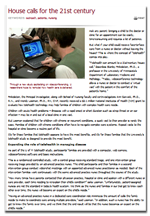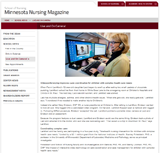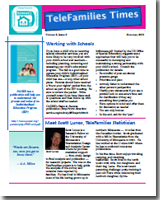A Telehealth Nursing Intervention for Children with Complex Health Care Needs
A research study supported in part by NIH grant R01NR010883
The overall objective of this study is to evaluate the effectiveness of a telehealth care coordination and case management nursing intervention for children with complex special health care needs. Children with complex special health care needs are those children who have multiple, complex, chronic health conditions who require health and related services of a type or amount beyond that required by children generally. The task of coordinating services and sharing information between providers almost always becomes the responsibility of the parent or guardian. Families report that their greatest challenges are the stress of coordinating multiple providers, and the disconnect and lack of communication between services and providers. This study addresses these issues, using an advanced practice nurse (APN) delivered program of telehealth care coordination and case management in support of these families. Goals of the program are to:
Reduce the number of crisis or unplanned uses of health care services and increase the number of non-crisis or planned health care service usage,
Improve the quality of life for these children and their families, and
Reduce the deficit between help needed and help received for the families in caring for these children.
TeleFamilies uses a three-armed randomized controlled trial (RCT) to test the effectiveness of APN directed care coordination and case management services using either telephone or telephone plus video communications with families at home, compared to usual LPN/RN delivered care coordination and telephone triage.
This study is supported in part by NIH grant R01NR01883 from the National Institute of Nursing Research. Collaborating organizations are the University of Minnesota and Children's Hospitals and Clinics of Minnesota.


